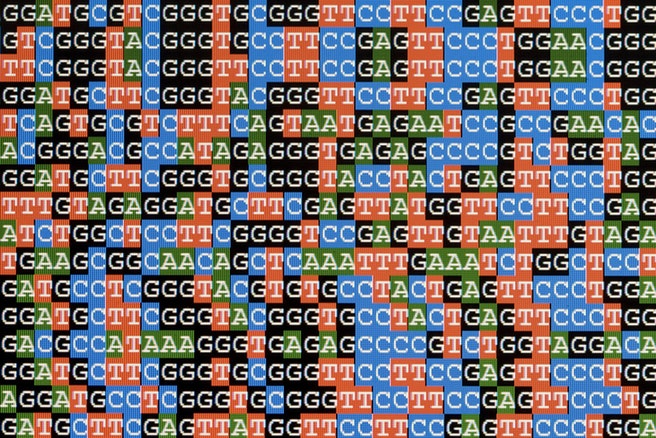
WHOLE GENOME SEQUENCING ( WGS )
While Single gene tests, panel tests, and microarray tests examine known variants in a predetermined gene, Whole Exome Sequencing Analysis (WES) examines only the EXON regions that encode functional proteins, and in Whole Genome Analysis (WGS), all the genes, coding and noncoding regions in the human genome are sequenced. By this way, nucleotide changes which may cause genetically complex diseases (such as cancers and intellectual disabilities) can be examined thoroughly.
Millions of patients today suffer from wrongly or undiagnosed genetic diseases because the most suitable technology was not applied. Although in many cases these tests (Single Gene Tests, Panel Tests etc.) are sufficient to identify the cause of a disease, these analyses have inherent limitations and can fail to reveal the full genetic cause.
WGS offers comprehensive identification of many more variants simultaneously in a single assay.
Existing research and diagnosis of genetic diseases have been heavily biased towards mutations in gene coding regions, that represents only 1% of a patient’s entire genome. Numerous clinical studies now exist which reveal the critical role of non-coding sequence variants in diseases. WGS identifies nearly all changes in a patient’s DNA by sequencing the entire coding and non-coding regions of the genome. It provides detailed information on the thousands of genes involved in normal growth and development and of all the ‘silent’ genomic regions simultaneously.
While, Whole Exome Sequencing WES provides 85% information regarding the diseases Whole Genome sequencing (WGS) provides 99% information with analyzing coding and noncoding variants, deletions, duplications and CNVs (Copy Number Variations).
As in many other tests, Clinical information and phenotypic characteristics of the patient are also very important in the success of WGS. The more detailed clinical information is provided, it is easier to find the relevant gene mutation among thousands of genes. For this, a very large mutation database is required, which makes the phenotype-genotype matching more successful and the patient's diagnosis can be determined more quickly.
WGS is similar to searching for addresses in a city just like in WES. The prepared clinical information serves as a navigation tool for address searching, and a comprehensive database and library is like our vehicle. While our vehicle is top model and our navigation tool is more qualified and detailed, it is easier and sooner to find the address in the streets of the city. WGS searches most of the city with a detailed look at to all houses and streets in the city. Even the ruined houses which we call ‘’deletions’’, or unlawful houses which we called ‘’insertions’’, or the dead-end streets which we can call CNV’s (Copy Number Variations).
WGS - for detection of somatic variants in cancer
The genetics underlying any given cancer can be complex and highly individual, involving a number of genes in coding and non-coding regions, in both germline and somatic cells.
WGS is the state-of-the-art technology for identifying variants to guide diagnosis and treatment of somatic cancers. Somatic mutations are found exclusively in tumour cell genomes; their frequency varies across different cancer types as do the relative proportions of non-coding and coding variants. A high proportion of somatic variants in tumours are structural variants including large genomic rearrangements. Somatic mutations in tumours often fall within known driver genes and hotspots but virtually all solid tumours have additional mutations which have an effect outside the known hotspot region.
A recent review in Nature Genetics compares the genetics of germline versus somatic cancers and highlights the importance of non-coding variants in somatic cancer.
Only WGS is capable of comprehensive tumour profiling across the genome, making it the best option for detecting causative cancer mutation in tumours at every stage of treatment.
In our center, CentoGenome is applied as WHOLE GENOME SEQUENCING (WGS) test. CentoGenome analysis is examined in the German CENTOGENE’s laboratory, one of the leading laboratories in Europe and the World in rare diseases which enhances state of the art WGS technology with expert filtering and interpretation of the data with the world’s largest mutation data base called CentoMD.
Patients who consults our center for WGS; a detailed clinical information gathered, previous test results are examined, a detailed pedigree (family tree) is drawn and general information is given regarding the genetic tests and a patient consent form is signed by the patient and the doctor. Afterwards blood samples are taken and spotted on special cards and all the information is entered to CENTOPORTAL system. The samples are shipped to Germany on the same day with special cards and the results are obtained in about one month.
After the test results are obtained, genetic counselling is given to patients with detailed interpretation of the results. In addition, after discussing the clinical and molecular aspects of the patient with his/her doctor, the diagnosis of the individual becomes clearer and the treatment method is more clearly determined by the physician.
For detailed information and appointment please contact with us…
